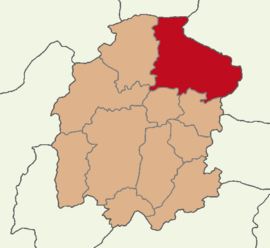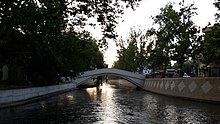Elbistan
Elbistan | |
|---|---|
District and municipality | |
 | |
 Map showing Elbistan District in Kahramanmaraş Province | |
| Coordinates: 38°12′05″N 37°11′18″E / 38.20139°N 37.18833°E | |
| Country | Turkey |
| Province | Kahramanmaraş |
| Government | |
| • Mayor | Erkan Gürbüz (CHP) |
Area | 2,201 km2 (850 sq mi) |
| Elevation | 1,150 m (3,770 ft) |
| Population (2022)[1] | 141,307 |
| • Density | 64/km2 (170/sq mi) |
| Time zone | UTC+3 (TRT) |
| Postal code | 46300 |
| Area code | 0344 |
| Website | www |
Elbistan (Old Anatolian Turkish: [Ablasta, Ablastayn, Ablastin, Ablistan] Error: {{Lang}}: Latn text/non-Latn script subtag mismatch (help);[2] Arabic: البستان (Al-Bustan) [3]) is a municipality and district of Kahramanmaraş Province, Turkey.[4] Its area is 2,201 km2,[5] and its population is 141,307 (2022).[1]
Etymology
[edit]The name "Elbistan" was pronounced similarly in Byzantine and Islamic sources. Elbistan was known as Plasta and Plastentia (Greek: Πλαστεντία) in antiquity. Elbistan was known as Ablasta (Armenian: Աբլաստա) according to Armenian historians in the early 11th century. According to Baldric of Dol the city was known as "Ablistan" till 15th century. Egyptian-Mamluk historian Muhammad ibn Iyas wrote the city's name as "Albistan". Alaüddevle Bozkurt Bey from Dulkadirids used the name "Elbistan" in the official documents. After Dulkadirids were conquered by the Ottoman Empire in the 16th century, the current name became prevalent. Among the rural people of Elbistan it is pronounced as "Albıstan". Albistan means "the orchard" in Arabic.[6]
History
[edit]This section needs expansion. You can help by adding to it. (February 2022) |
The settlement of the Elbistan plain around the town of Elbistan goes back to prehistoric times. In 1947, an important Anatolian hieroglyphic inscription stele was discovered near the village of Karahüyük (Elbistan), which is located 9 km northwest from Elbistan town. This stele is believed to be from the 12th century BC.[7]
In the mid-10th century, modern settlement of the area begins. The town seems to have been settled first by Armenian immigrants.[8] By the end of the 11th century, the town had become the most important one in the Elbistan plain, was fortified against Turkish raiders and was seat of an Armenian bishop.[8] When the army of the First Crusade passed through Anatolia recovering land for the Byzantine Empire in 1097, Peter Aliphas was installed as governor of Plastentia.[9]
In 1277 the Mamluks led by Baybars defeated a Mongol army in the Battle of Elbistan. Thereafter, Elbistan and the region around it became part of the Mamluk northern frontier.[10] In 1337 Zeyneddin Karaca Bey captured the town from the Mamluks and established the Beylik of Dulkadir with the region around Elbistan and Marash as its center.[11] Nevertheless, Dulkadirids continued to pay homage to the Mamluks and fought with the Karamandids to defend Mamluk interests though they sought for more autonomy.[10] The Dulkadirids controlled the region for 178 years until the Ottomans finally conquered it in 1515.[11]



Elbistan became then known as "vilayet-i Türkmân" in the Ottoman documents.[12] Evliya Çelebi's Seyahatnâme from the 17th century gives information about the region that in the mountains and towns mostly reside Turkmens who originally migrated from Bukhara.[13][14] It seems that some local chiefdoms were given varying degrees of autonomy, notably around the localities of Haticepınar and Kasanlı.
Demographics
[edit]Evliya Çelebi noted that the majority of the town's population was Turkoman in his seyahatname.[15] Currently, the majority of the population of the district is Sunni Turkish[16] with a significant Alevi and Sunni Kurdish population.[17][18] Turkish Alevis are also present.[19] The Turkmen Alevism of the region is historically rooted in the Alevi Turcoman Beylik of Dulkadir in the 14th century.[2][20]
Climate
[edit]Elbistan has a fairly dry climate with cold winters and hot, dry summers. Elbistan's climate is classified as a dry-summer continental climate (Köppen: Dsa).[21]
| Climate data for Elbistan (1991–2020) | |||||||||||||
|---|---|---|---|---|---|---|---|---|---|---|---|---|---|
| Month | Jan | Feb | Mar | Apr | May | Jun | Jul | Aug | Sep | Oct | Nov | Dec | Year |
| Mean daily maximum °C (°F) | 3.2 (37.8) |
5.8 (42.4) |
11.8 (53.2) |
17.7 (63.9) |
22.9 (73.2) |
28.3 (82.9) |
32.5 (90.5) |
32.9 (91.2) |
28.4 (83.1) |
21.5 (70.7) |
12.6 (54.7) |
5.7 (42.3) |
18.7 (65.7) |
| Daily mean °C (°F) | −1.8 (28.8) |
0.1 (32.2) |
5.6 (42.1) |
11.0 (51.8) |
15.5 (59.9) |
20.3 (68.5) |
24.1 (75.4) |
24.1 (75.4) |
19.2 (66.6) |
13.0 (55.4) |
5.4 (41.7) |
0.6 (33.1) |
11.5 (52.7) |
| Mean daily minimum °C (°F) | −6.0 (21.2) |
−4.8 (23.4) |
−.2 (31.6) |
4.2 (39.6) |
8.0 (46.4) |
11.4 (52.5) |
14.3 (57.7) |
14.2 (57.6) |
9.7 (49.5) |
5.5 (41.9) |
0.0 (32.0) |
−3.3 (26.1) |
4.5 (40.1) |
| Average precipitation mm (inches) | 39.95 (1.57) |
37.72 (1.49) |
45.19 (1.78) |
51.44 (2.03) |
44.19 (1.74) |
18.38 (0.72) |
4.28 (0.17) |
2.42 (0.10) |
12.22 (0.48) |
46.89 (1.85) |
42.46 (1.67) |
39.86 (1.57) |
385.0 (15.16) |
| Average precipitation days (≥ 1.0 mm) | 6.2 | 6.4 | 6.8 | 7.3 | 6.9 | 3.5 | 1.7 | 1.5 | 2.4 | 5.4 | 5.6 | 6.2 | 59.9 |
| Average relative humidity (%) | 73.7 | 69.3 | 62.2 | 58.2 | 58.0 | 52.8 | 47.7 | 48.2 | 50.7 | 61.6 | 69.2 | 74.4 | 60.5 |
| Source: NOAA[22] | |||||||||||||
Economy
[edit]The Elbistan coalfield supplies lignite to the nearby Afşin-Elbistan power stations in Afşin.
Environment
[edit]It is said that air pollution in Turkey from the nearby coal-fired power stations also affects Elbistan, as well as smoke from landfill.[23] In late 2020 the oldest plant Afşin-Elbistan A, was said by opposition MP Ali Öztunç to be still operating without filters.[24]
Composition
[edit]There are 92 neighbourhoods in Elbistan District:[25]
- Ağlıca
- Akarca
- Akbayır
- Akören
- Aksakal
- Alembey
- Alkayaoğlu
- Armutalan
- Atmalıkaşanlı
- Bahçelievler
- Bakış
- Balıkçıl
- Battalgazi
- Beştepe
- Beyyurdu
- Büyükyapalak
- Çalış
- Çatova
- Ceyhan
- Çiçekköy
- Çıtlık
- Cumhuriyet
- Demircilik
- Dervişçimli
- Doğan
- Eldelek
- Elmalı
- Esentepe
- Evcihüyük
- Fakıoğlu
- Geçit
- Gökçek
- Gücük
- Gümüşdöven
- Günaltı
- Gündere
- Güneşli
- Güplüce
- Güvercinlik
- Hacıhasanlı
- Hasanalili
- Hasankendi
- Horhor
- İğde
- İkizpınarı
- İncecik
- Izgın
- Kalaycık
- Kalealtı
- Kangal
- Kantarma
- Karaelbistan
- Karahasanuşağı
- Karahüyük
- Karamağara
- Kavaktepe
- Kayageçit
- Keçemağara
- Kışlaköy
- Kızılcıoba
- Köprübaşı
- Körücek
- Köseyahya
- Köşkköy
- Küçükyapalak
- Kümbet
- Orhangazi
- Ovacık
- Özbek
- Özcanlı
- Pınarbaşı
- Sarıyatak
- Sevdili
- Söğütlü
- Sünnetköy
- Tapkıran
- Tapkırankale
- Taşburun
- Tepebaşı
- Topallı
- Toprakhisar
- Türkören
- Uncular
- Uzunpınar
- Yalakköy
- Yalıntaş
- Yapılı
- Yapılıpınar
- Yapraklı
- Yeşilyurt
- Yoğunsöğüt
- Yunusemre
Notable people
[edit]- Mustafa Atici, Swiss politician of Kurdish descent
- Mazlum Çimen, ballet dancer, award-winning film score composer and folk singer
- Fidan Doğan, murdered Kurdish activist
- Tulay Goren, missing Kurdish schoolgirl
- Kemal Gözükara, mathematician, businessman and president of the Istanbul Arel University
- Mahir Ünal, Turkish MP and former minister of Culture and Tourism
- Tahsin Yücel, Turkish translator, novelist, essayist and literary critic
References
[edit]- ^ a b "Address-based population registration system (ADNKS) results dated 31 December 2022, Favorite Reports" (XLS). TÜİK. Retrieved 19 September 2023.
- ^ a b Aksüt, Ali. "On the Alevism of Elbistan, Nurhak, Ekinozu and Afsin - Elbistan Nurhak Ekinözü Afşin Aleviliği Üzerine - Zum Alevitentum in Elbistan, Nurhak, Ekinözü und Afşin" - Alevilik-Bektaşilik Araştırmaları Dergisi 2017 (No.15), pp.264-265, 279 doi:10.24082/abked.2017.15.011
- ^ "معلومات عن البستان على موقع geonames.org". geonames.org. Archived from the original on 11 December 2019.
- ^ Büyükşehir İlçe Belediyesi, Turkey Civil Administration Departments Inventory. Retrieved 19 September 2023.
- ^ "İl ve İlçe Yüz ölçümleri". General Directorate of Mapping. Retrieved 19 September 2023.
- ^ [1] Elbistan İsminin Tarihçesi
- ^ Karahöyük (Elbistan) Stele hittitemonuments.com
- ^ a b Sinclair, T A (1989). Eastern Turkey: An Architectural and Archaeological Survey, Volume II. ISD LLC. ISBN 9781904597735.
- ^ Frankopan, Peter (2012). The First Crusade: The Call from the East. Harvard University Press. p. 149. ISBN 9780674064997.
- ^ a b Muslu, Cihan Yüksel (25 July 2014). The Ottomans and the Mamluks: Imperial Diplomacy and Warfare in the Islamic World. Bloomsbury Publishing. ISBN 978-0-85773-580-5. Retrieved 18 February 2024.
- ^ a b Har-El, Shai (1995). Struggle for Domination in the Middle East: The Ottoman-Mamluk War, 1485-91. Brill. p. 40. ISBN 9789004101807. Retrieved 20 January 2023.
- ^ Akdeniz'in Altın Kenti Kahramanmaraş. Kahramanmaraş Valiliği İl Kültür ve Turizm Müdürlüğü. p.33 ISBN 978-605-149-657-3 (PDF)
- ^ Derviş Mehmet Zılli bin, Evliya Çelebi (2006). "Mar-iş (Maraş)". Seyahatname. Yeni Şafak Gazetesi. p. 297. ISBN 975-363-798-5.
- ^ "Elbistan" - Official website of the Kahramanmaras Governor (Kahramanmaraş Valiliği)
- ^ Evliyâ Çelebi Seyahatnâmesi: III. p. 201. Retrieved 17 October 2022.
- ^ "'Maraş'ta Alevi Kürtlerin nüfusu yüzde 10'lara düştü'". 15 June 2017. Archived from the original on 27 August 2021. Retrieved 27 August 2021.
- ^ McDowall, Donald (November 2002). "Asylum seekers from Turkey II" (PDF). p. 64.
- ^ Turkish state (2014), Aşiretler Raporu (in Turkish) (3 ed.), Kaynak Yayınları, p. 205, ISBN 978-975-343-220-7
- ^ Dursun, Mehmet E.; Kirik, Esra. Elbistan Ağzı (Kahramanmaraş Ağızları - II). Turkish Studies - International Periodical For The Languages, Literature and History of Turkish or Turkic Volume 7/1 Winter 2012, p.1045 DOI:10.7827/TurkishStudies.3174 (PDF)
- ^ Aras, Bahtiyar Murat; Gökhan, İlyas. "Pazarcık Türkmen Alevileri" - Sosyal Bilimler Enstitüsü Bölümleri [638]. pp.18, 30, 78, 94, 110-111, 156, 433, 439, 443-444,
- ^ "Table 1 Overview of the Köppen-Geiger climate classes including the defining criteria". Nature: Scientific Data.
- ^ "World Meteorological Organization Climate Normals for 1991-2020 — Elbistan". National Oceanic and Atmospheric Administration. Retrieved 14 January 2024.
- ^ Sesi, Elbistanın. "Dumanı hem boğuyor hem zehirliyor, kokusu da cabası!". Elbistanın Sesi (in Turkish). Retrieved 5 October 2020.
- ^ Akdemir -, Özer (11 September 2020). "Afşin Elbistan Termik Santrali A Ünitesi hâlâ filtresiz çalışıyor! | Özer Akdemir". Ekoloji Birliği (in Turkish). Retrieved 5 October 2020.
- ^ Mahalle, Turkey Civil Administration Departments Inventory. Retrieved 19 September 2023.



